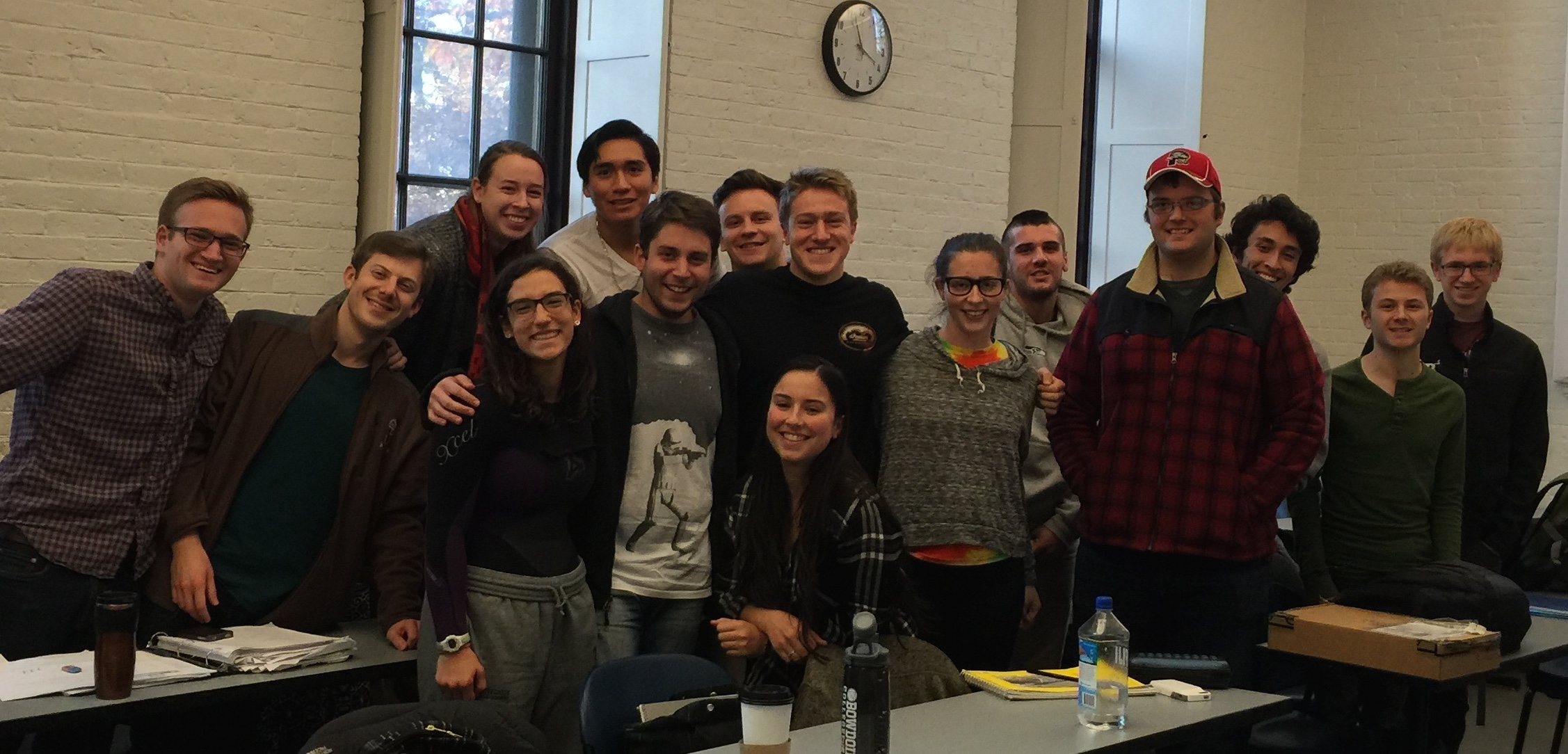Csci 2200: Introduction to Algorithms (Fall'14)
 Useful links | Schedule
Useful links | Schedule
Lecture: Tu, Thu 10-11:25, Searles 126 | Lab: Wed 2:30 - 3:55, Searles 126
Professor: Laura Toma
Office: Searles 219
Contact: ltoma at bowdoin dot edu, (207) - 725 - 3569
Prerequisites: csci 101 (Intro to CS) and csci
2101 (Data Structures). Generally speaking, a good mathematical
background and good QR skills are not required, but are helpful.
Textbook (required): Cormen, Leiserson, Rivest and
Stein, Introduction
to Algorithms, 3rd Edition, McGraw Hill, New York, 1990. (bugs).
Class webpage:
http://www.bowdoin.edu/~ltoma/teaching/cs231/fall14/. Note that
this is a link from my personal website at Bowdoin. This site will
contain all class-related material along the semester. The class does
not have a Blackboard site (I believe class information and materials
shoud be public, not hidden behind logins).
Schedule: For useful links and detailed class schedule, check Syllabus.
Course overview
This course is an introduction to the design and analysis of
algorithms. We talk about the mathematical model for analysing the
efficiency of algorithms and introduce asymptotic notation and
recurrence relations.
We discuss fundamental data structures such as search trees and
augmented search trees, priority queues, skip lists and union-find
data structures.
We introduce major algorithmic problems such as searching, sorting and
selection, matrix multiplication, optimization, graph problems,
networks, string matching and NP-completeness.
We discuss a variety of solutions to these problems, while
illustrating techniques such as divide-and-conquer, dynamic
programming and greedy.
The class is theoretical and involves no programming.
Course goals:
- To be able to analyze the asymptotic performance of algorithms using big-oh and big-theta notation
- To be able to compare multiple algorithms for a problem and predict performance
- To be able to argue informally that an algorithm is correct
- To be familiar with the fundamental algorithms and data structures
- To be familiar with the major design paradigms
- To be able to apply these techniques to new problems
.....and more broadly:
- To get an appreciation of algorithms and an understanding of their importance and impact in Computer Science and beyond
- To improve problem solving skills and power of abstraction
- To develop a database of algorithms and techniques which you'll use as building blocks to solve new problems
Office hours, TAs and study groups
Office hours (Toma): Tu, Th 2:30-4pm
For quick questions you can drop by any time the door is open. If
you cannot come during these times, send me an email to make an
appointment. For specific questions on the assigments, I encourage you
to talk to the TAs first and attend at least one of the study
groups. They hold study groups for YOU!
TAs: Andrew Daniels, Anthony Todesco
Study groups:
- Sundays 8-10pm (Anthony), Tuesdays 8-10pm (Andrew) in 224
Labs
The lab time is dedicated to problem sets. A lab will usually contain
a set of problems do be done in the lab, and a problem set that
becomes the homework assignment for the next week.
The course relies heavily on group work and peer instruction, so it is
crucial that you attend all classes and all labs.
Homeworks, Exams and Grading policy
Homework: The weekly lab will contain some problems
to be solved in the lab, and a set that constitues the homework for
the subsequent week. The homeworks will generally be due a week later
(unless specified otherwise). Late assignments are not accepted
(except in case of medical reasons).
Exams: There will be two exams, one half-way
through the semester (precise date TBD), and the second one during the
final exam period. The exams will be take-home, open book and open
notes, and non-cumulative.
Homework collaboration policy: You are encouraged
to work on problems in a group. You will find that you will gain a
better understanding of the material by discussing the problems with
your partners. However, you must write up the solutions
individually. Limit your collaborators to three or
less, and list the names of the collaborators on the homework.
Grading policy: The final grade is determined as
follows:
- Homework assignments (40%).
- 2 exams (2 x 30 = 60%).
- Class participation (5%)
Topics
The following general topics will be covered, which correspond to
chapters in your textbook and will be studied approximately in the
same order as they appear in the textbook. For a precise schedule,
check the syllabus.
- Mathematical foundation (growth of functions, summations, recurrences, induction)
- Sorting algorithms (insertion sort, selection sort, mergesort, quicksort, heapsort, sorting lower bounds, bucket sort, radix sort)
- Searching and data structures (binary search trees, red-black trees, augmented search trees, skip lists)
- Priority queues (binary heap)
- Selection
- Paradigms (divide-and-conquer, greedy, dynamic programming)
- Graph Algorithms (traversal, minimum spanning trees, shortest paths)
- Network algorithms (network flow)
- String matching algorithms
- NP-completeness
Academic Integrity
You are expected to follow Bowdoin's academic honor
code. Collaboration on homeworks is encouraged, however you are
responsible to write the solutions on your own, and list the names of
all your collaborators. You may not glance over someone else's written
solution, and you may not share your problems sets and exams with
anybody else, this term or in the future. Any violation will be
reported and treated according to Bowdoin's academic integrity
guidelines.

